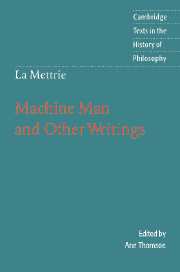Anti-Seneca or the Sovereign Good
Published online by Cambridge University Press: 05 June 2012
Summary
Happy was the man who was able to know the causes of things!
Note on the text
Of all La Mettrie's works, this is the one that he seems to have rewritten the most. It first took the form of an introduction to his translation of Seneca, on which La Mettrie began to work during 1748, published under the title of Traité de la vie heureuse, par Senèque. Avec un Discours du traducteur sur le même sujet (Treatise on the Happy Life, by Seneca, with a Discourse by the Translator on the same Subject), by Voss in Potsdam in late 1748. La Mettrie reworked it extensively in 1750, probably for inclusion in his philosophical works; in doing this, he was perhaps following the advice contained in a remark which appeared in the Bibliothèque raisonnée in 1748. However, the work was not finally included in the volume of philosophical works, perhaps due to opposition from Maupertuis and fear of an unfavourable reaction from the King, and it was published separately, in an edition of only twelve copies, under the title of Anti-Senèque ou le souverain bien (Anti-Seneca, or the Sovereign Good), Potsdam, 1750. La Mettrie then decided to alter it again, and published another edition with the same title, giving the publisher as J. Wetstein in Amsterdam, in 1751. This edition included a polemical preface (not given here), defending the work against attacks, in which he develops some of the points already made in the Preliminary Discourse.
- Type
- Chapter
- Information
- La Mettrie: Machine Man and Other Writings , pp. 117 - 144Publisher: Cambridge University PressPrint publication year: 1996
- 2
- Cited by



